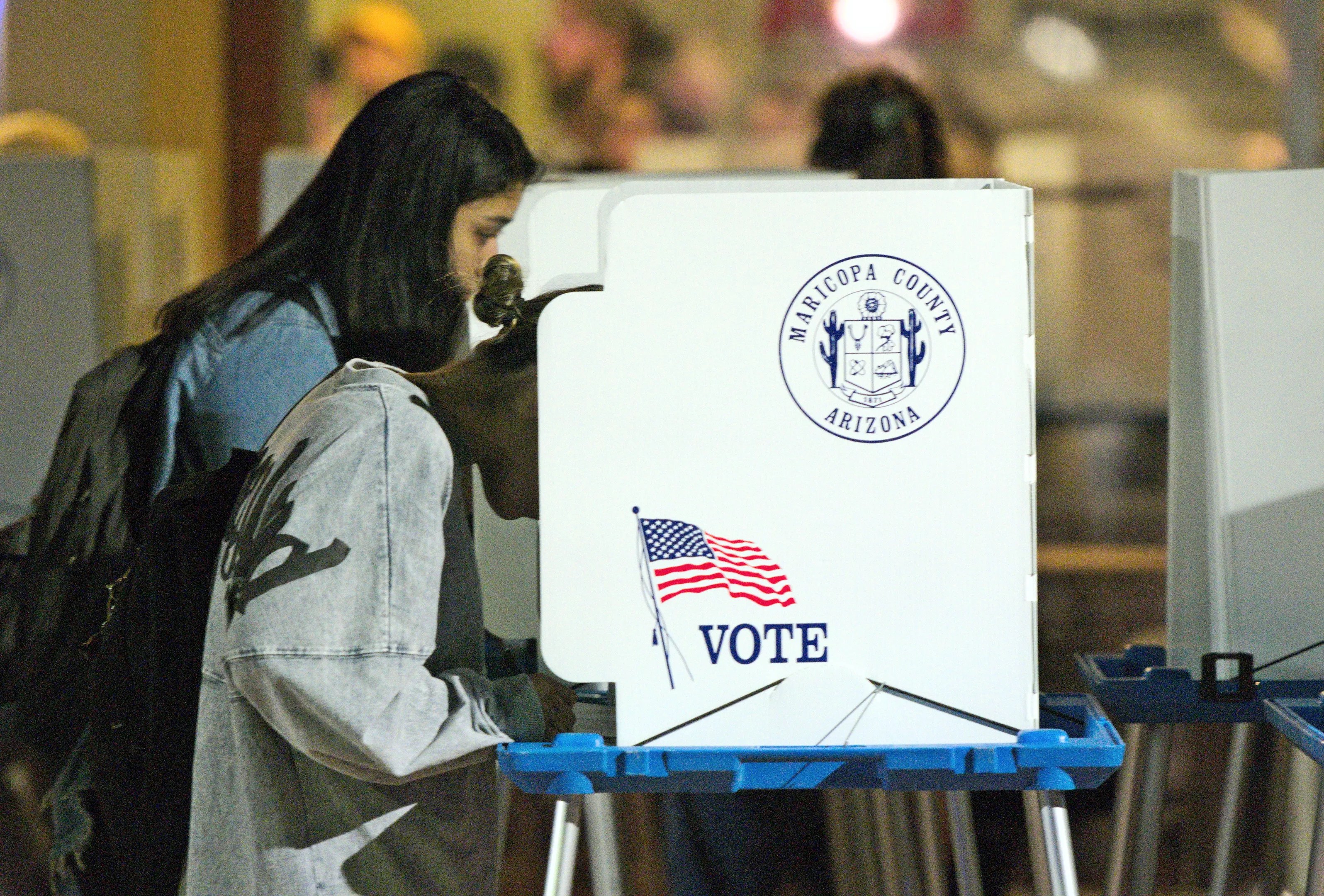
Benjamin Leatherman

Audio By Carbonatix
Even though the polls closed days ago and the election is over, many of the campaign results in Arizona are far from final. Votes for congressional, legislative and other key races are still being tallied and are too early to call.
But voters across Arizona decided on the 13 statewide ballot measures far more decisively. Currently, the closest margin on the simple yes or no questions is about seven points, making it safe to say we know which ballot measures will pass and which will fail when all is said and done.
Eleven of those measures were referred to the ballot by Republican state lawmakers in an attempt to bypass vetoes from Democratic Gov. Katie Hobbs. Only two of those 11 had support from any Democratic lawmakers.
Two of the ballot measures were citizen-led initiatives: Proposition 139, which will codify a right to abortion in the state constitution, and Proposition 140, which aimed to eliminate partisan primary elections.
Here’s how voters decided each measure. Vote percentages are of Friday morning.
Measures that will pass
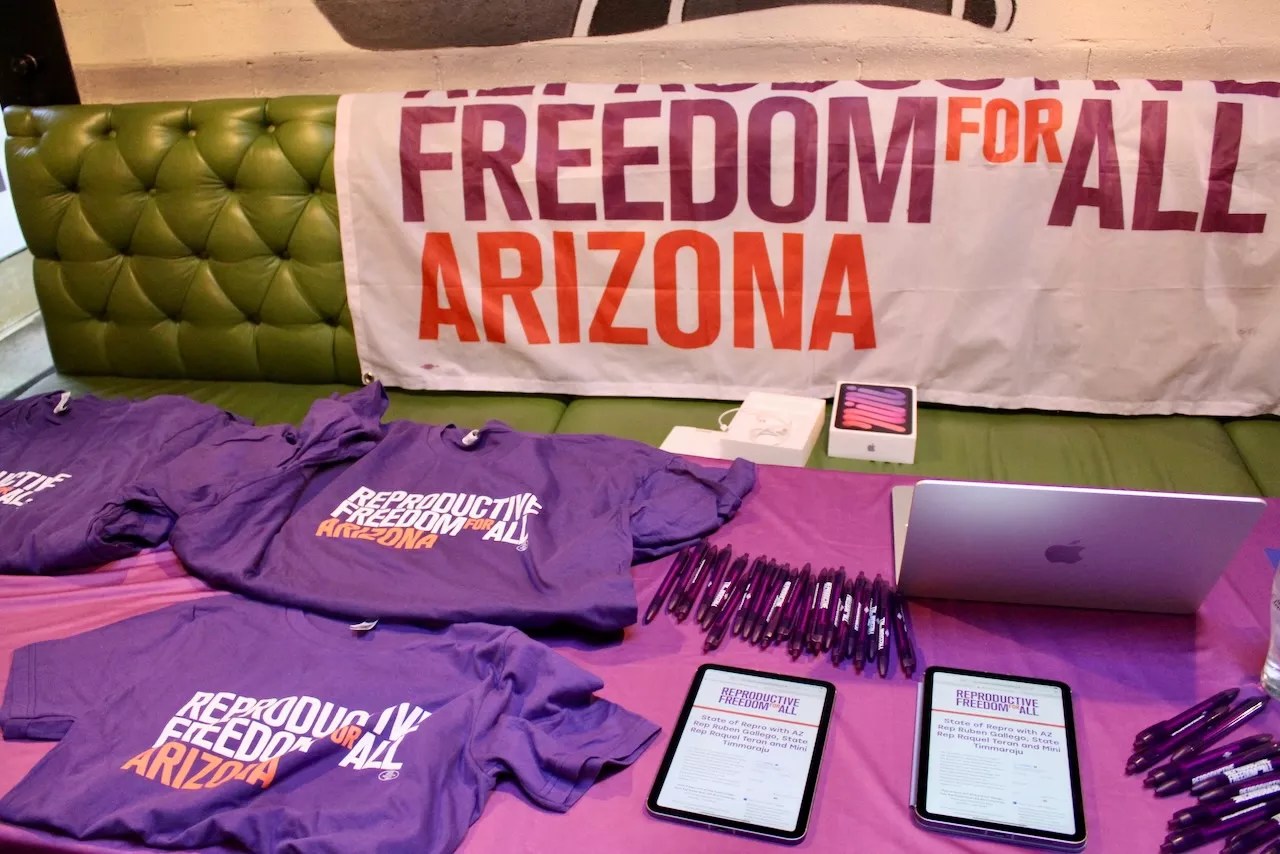
Voters overwhelmingly approved a constitutional amendemnt to protect abortion rights.
TJ L’Heureux
Proposition 139: Expanding abortion access
Yes 61.2%, No 38.8%
Petitioners gathered more than 823,000 signatures in favor of a measure to establish a fundamental right to abortion until fetal viability, and voters overwhelmingly approved it, amending Arizona’s Constitution.
The amendment makes abortion legal up to fetal viability, which typically occurs after 23 or 24 weeks of gestation. It also prevents the state from enforcing laws that interfere with abortions if the pregnant person’s health is at risk.
According to Axios, it could be some time before the law actually kicks in. And news outlets have been noting that even if measure does take effect, President-elect Donald Trump and his allies may attempt to institute a national ban on abortion, overruling Arizona’s new law.
Proposition 139’s passage comes in the aftermath of the U.S. Supreme Court overturning Roe v. Wade in 2022, which in turn led to the Arizona Supreme Court reinstating an 1864 near-total ban on abortion earlier this year. Three Republicans in the House and two in the Senate joined Democrats to narrowly overturn the Civil War-era law this summer. Proposition 139 now nullifies a 15-week ban passed in 2022.
Proposition 311: Conviction fee
Yes 64.1%, No 35.9%
The measure requires a $20 fee to be tacked on to every criminal conviction, placing the money in a fund for spouses or children of first responders and police officers who are killed in the line of duty.
The family of any killed first responder or officer will receive $250,000. That is in addition to a federal program that gives $422,035 to the families of police officers who die while working. The Arizona pension system also gives a benefit to the surviving family members of police officers, firefighters and corrections officers.
The measure had support from more than half of Democrats in the Arizona House of Representatives but none in the Senate.
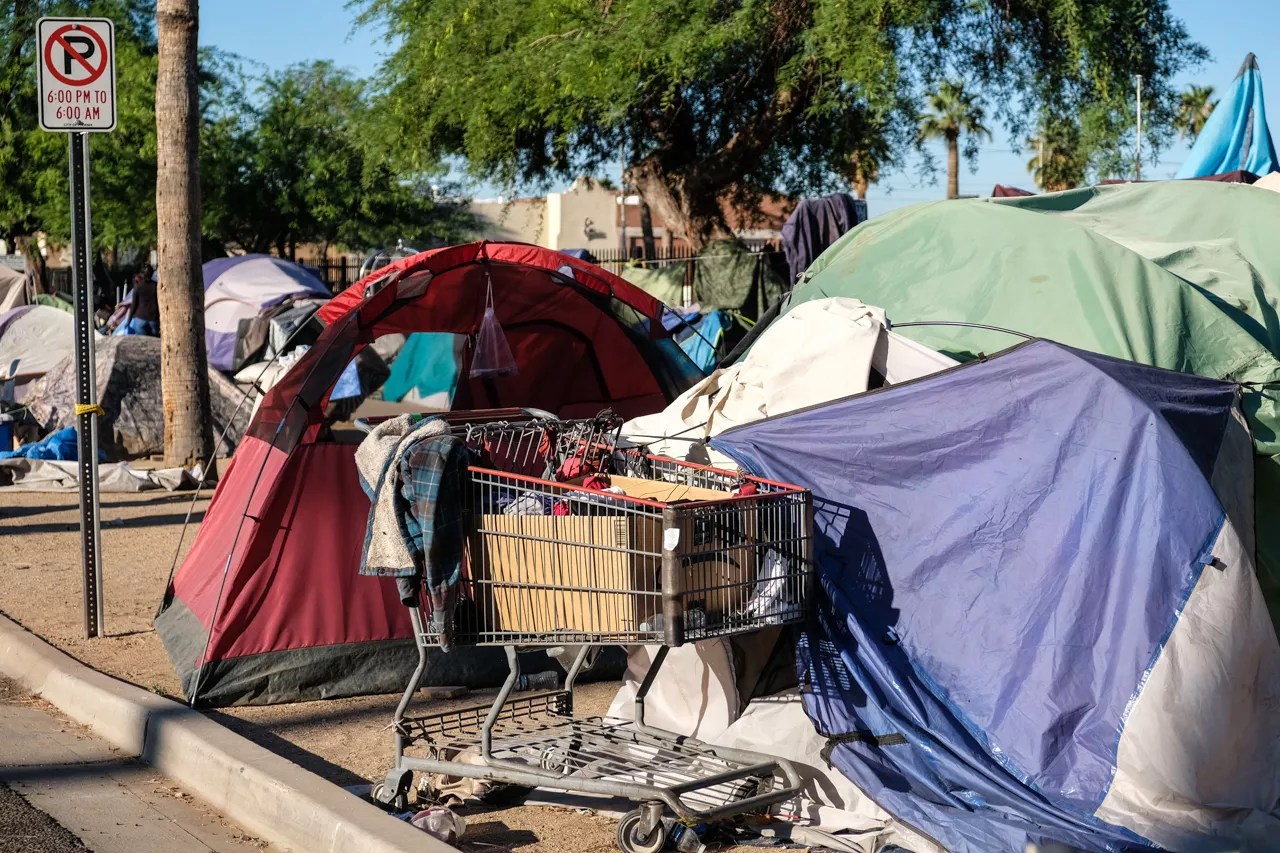
Voters approved a measure allowing property tax refunds when cities don’t enforce “public nuisance” laws.
Katya Schwenk
Proposition 312: Property tax refunds for public nuisance
Yes: 58.6%, No: 41.4%
This measure allows property owners to apply for tax refunds if they can show their city is not enforcing laws that target unhoused people.
This was a Republican effort to force cities’ hands in taking an even more severe approach to policing homelessness and comes after property owners in the Zone successfully sued to break up the large encampment in the area.
Critics say the measure won’t do anything to solve homelessness and will instead siphon resources that cities use to address the problem more directly. But Arizona’s libertarian-conservative think tank Goldwater Institute celebrated the law’s passage.
“Now that Prop. 312 is law, business and property owners will not be left holding the bag when municipalities refuse to do their job,” Goldwater’s president and CEO Victor Riches said in a press release.
Proposition 313: Life imprisonment for child sex trafficking
Yes 64.3%, No 35.7%
The constitutional amendment, which enjoyed overwhelming support, mandates life in prison for anyone convicted of child sex trafficking.
Critics warned that people who were originally victims of sex trafficking could also be locked away forever after being pulled into a vicious cycle of coercing others. No exception was made for such cases in the bill, but voters passed it by a large margin.
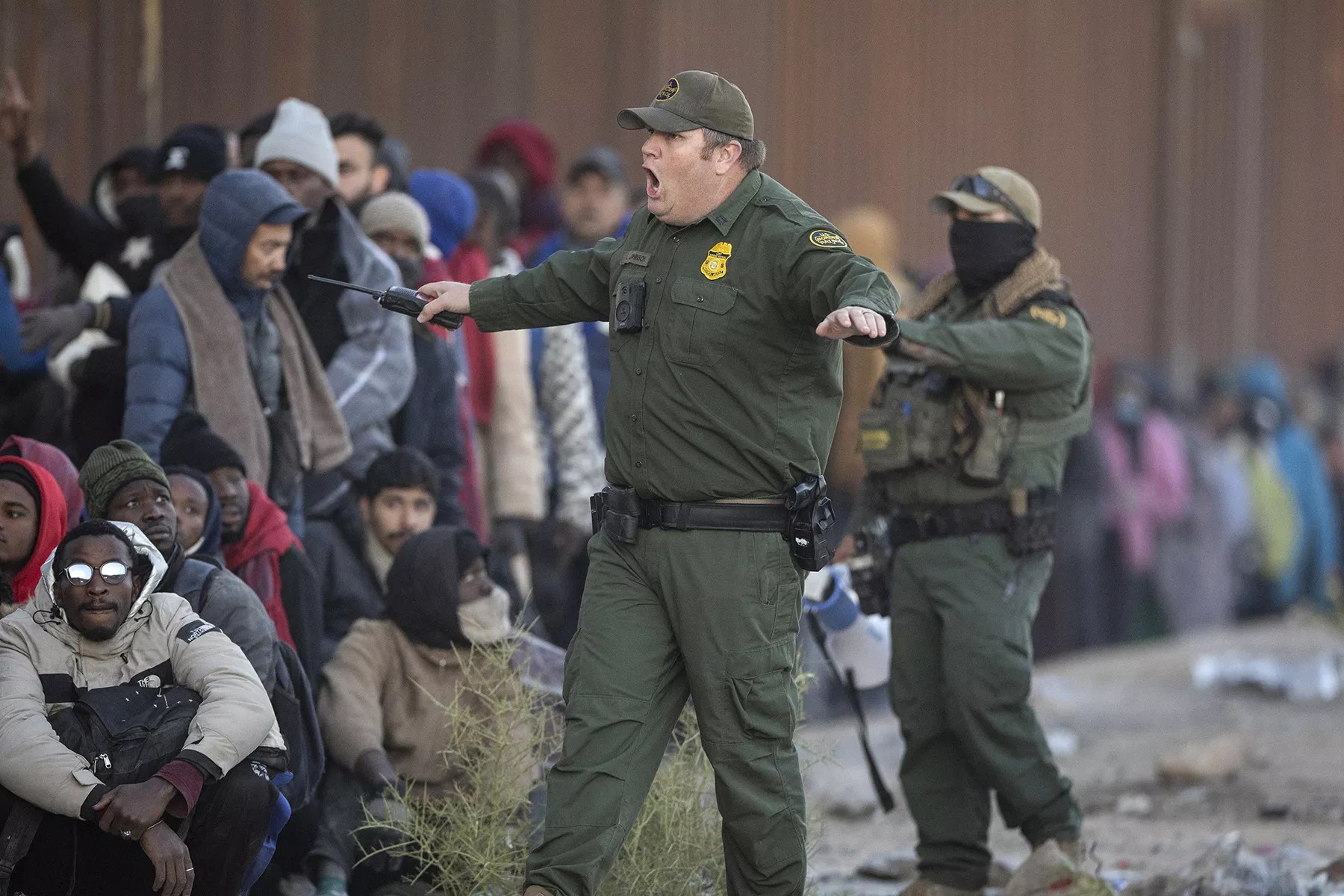
Already a federal crime, crossing the U.S. border illegally in Arizona will now be a state offense as well after voters approved Proposition 314.
John Moore/Getty Images
Proposition 314: The “Secure the Border Act”
Yes 63%, No 37%
Proposition 314 was the most high-profile measure on the ballot referred by Republican lawmakers. Set to pass by an overwhelming margin, the “Secure the Border Act” will fundamentally change immigration in Arizona.
It will now be state crime to illegally cross the border – it is currently a federal crime only – and the law grants enforcement power to state and local officials. Those officials also will receive civil immunity that shields them from lawsuits.
In tandem with the victory of incoming Maricopa County Sheriff Jerry Sheridan, the right-hand man to infamous former Sheriff Joe Arpaio, critics say Proposition 314 will open the door for a major crackdown and send Arizona directly back into the era of Senate Bill 1070.
Proposition 314 also criminalizes undocumented Arizonans who submit false information to apply for public benefits and would make it a more severe crime to knowingly sell fentanyl that results in a person’s death.
A conservative estimate suggests that the implementation of Proposition 314 will cost the state hundreds of millions of dollars, which hasn’t been reserved in the state budget. Another estimate projects the measure will have an annual price tag of $3.2 billion.
Measures that will fail
Prop. 133: Partisan primaries for partisan offices
No 57.5%, Yes 42.5%
This measure would have amended the Arizona Constitution to require partisan primary elections for partisan offices. It was a response to the voter-organized Make Elections Fair Act, which would turn primaries into nonpartisan contests. Both measures failed.
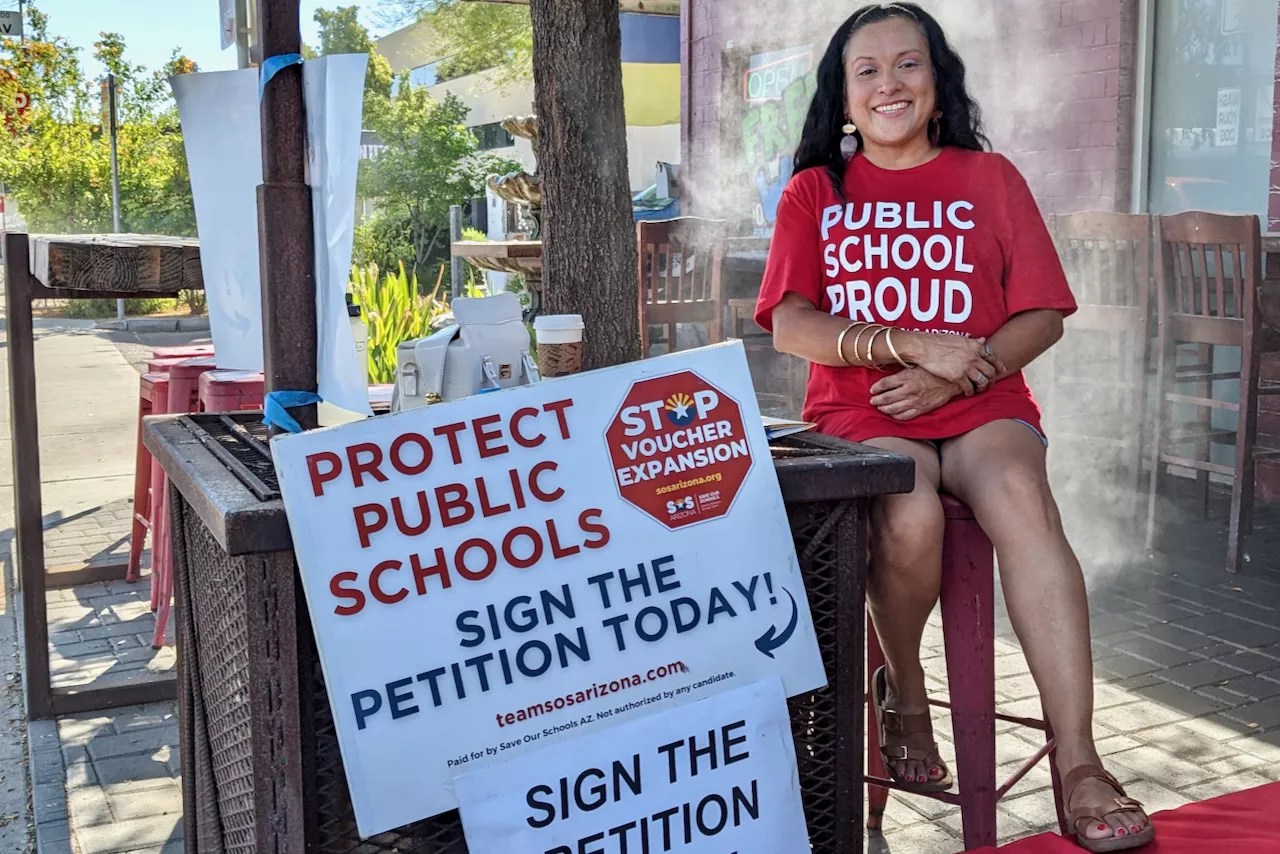
Proposition 134 would have made it more difficult to mount citizen-led initiatives.
Matt Hennie
Proposition 134: Changing voter initiative signature requirements
No 57.7%, Yes 42.3%
The measure aimed to dramatically change the way signatures are gathered for citizen-led initiatives, making it more difficult to get them on the ballot.
But voters rejected it, and requirements to organize citizen-led initiatives remain the same: They must collect signatures amounting to 10% or 15% of the number of votes cast statewide in the last election for governor, depending on whether the change is to state law or to the Arizona Constitution.
Prop: 135: Declaring emergencies
No: 56.7%, Yes: 43.3%
This measure was supposed to give legislators power over state-of-emergency declarations, allowing them to terminate a state of emergency declared by the governor, with the exception of war-, fire- and flood-related emergencies.
The Arizona Free Enterprise Club supported the measure and framed it as a matter of checks and balances in government. The Arizona Public Health Association opposed the bill, noting it would make it harder for leaders to manage emergencies.
Proposition 136: Challenging initiatives’ constitutionality
No 61.6%, Yes 38.4%
This law would have allowed voter-organized constitutional amendments to be challenged in court after the measure is filed with the Secretary of State’s Office and before it’s been placed on the ballot.
Due to the costs of mounting ballot initiative campaigns, not to mention defending them in court, critics said the change would have made successfully placing a measure on the ballot almost prohibitively difficult.

A Republican-backed effort to cut voters out of the judicial retention process — and save the jobs of Arizona Supreme Court justices Clint Bolick (above) and Kathryn King — failed. Bolick and King were retained anyway.
Gage Skidmore/Flickr/CC BY-SA 2.0
Proposition 137: End term limits for state Supreme Court justices
No 77.2%, Yes 22.8%
This measure would have ended term limits for state Supreme Court justices and superior court judges, removing most judges from the ballot’s judicial retention section. It also would have applied retroactively, meaning if voters had removed Arizona Supreme Court Justices Clint Bolick and Kathryn King, the two justices would have remained on the bench if Proposition 137 passed.
The amendment did not pass, and voters chose to retain Bolick and King. So nothing changed at all. Voters still have the power to remove judges from the bench at the end of their terms, though they have never done so for a state Supreme Court justice.
Proposition 138: Reducing wages for tipped workers
No 74.4%, Yes 25.6%
This ballot measure was one that would have allowed tipped workers to be paid 25% less than the minimum wage if income from tips passed a certain threshold. This amendment – which was pushed heavily by the restaurant industry – would have lowered wages for tipped workers slightly compared with what they earn now.

Though dubbed the “Tipped Worker Protection Act,” Proposition 138 would have actually lowered the minimum wage for tipped workers.
SDI Productions/Getty Images
Proposition 140: Eliminating partisan primaries
No 59.1%, Yes 40.9%
The initiative was organized by former Republican and political consultant Chuck Coughlin to make primaries less extreme. It would have replaced partisan primaries with an open primary system, meaning voters would cast primary ballots for candidates from all parties, after which the top vote-getters would face off in the general election.
Even though Proposition 133 came numerically before this measure, it was developed in response to it. In essence, the two propositions were opposites.
“To win a Republican primary, you just say a bunch of shit you don’t believe,” Coughlin told Phoenix New Times. “Twenty percent of Republican voters turn out in the primary.”
But Coughlin’s dream, which was opposed by Republicans and Democrats alike, fell short.
Proposition 315: Preventing regulations that cost more than $500,000
No 53.1%, Yes 46.9%
By far the most boring of the 11 measures was this one banning any state agency-issued regulations estimated to cost more than $500,000 within five years of their implementation, unless approved by the state legislature. It is set to fail.